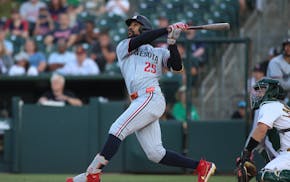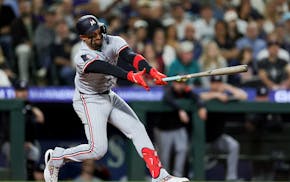Kirk Cousins took his turn Wednesday lauding his team's revamped defense under new coordinator Brian Flores on the final day of the Vikings' offseason program.
The veteran quarterback called Flores' scheme a "great challenge" while acknowledging the different alignments he's seen in spring practices had made him realize "there's some nuances to football that I've got keep learning and get better with."
Praise for Flores and the defense has been a common theme among Vikings offensive players, which is encouraging, but the true measure won't come until this fall when players are in pads hitting, tackling and covering receivers at full speed.
That's when the Vikings need the man nicknamed "BFlo" to prove that he's a coaching savant/magician. That will be especially important if the organization's contract stalemate with Danielle Hunter ends with him being traded.
First impression of Flores' defense based on viewing OTA and minicamp practices: A) The scheme is ultra-aggressive with an array of blitz packages, and B) the defensive personnel is thin on proven difference-makers.
Losing a premier edge rusher like Hunter would leave a large hole.
General manager Kwesi Adofo-Mensah began the offseason with a lengthy to-do list. Cousins' future and Justin Jefferson's mega-contract belong above everything else. Hunter's situation presents a problem without an easy solution.
Start with an indisputable fact: the Vikings defense is better with Hunter than without him. No duh, right?
If the team trades Hunter, who will supply the pass rush? Marcus Davenport? D.J. Wonnum? Patrick Jones II?
The Vikings are hopeful that a new setting and Flores' influence will unleash something in Davenport, but he recorded only 0.5 sacks for New Orleans last season. He's an unknown until proven otherwise.
The entire defense is filled with question marks. That doesn't mean young or unheralded players won't thrive with an expanded role in a new system, but the uncertainty cannot be ignored. Other than veteran safety Harrison Smith and Hunter, the overall résumé is light on high-level performers.
The argument for trading Hunter stems from the perception that the organization has shifted into a rebuilding phase. That's partly true based on veterans who have been jettisoned, but retooling the roster to get younger and shed constrictive contracts shouldn't prevent the Vikings from being contenders in the division.
The offense features a Top 15 quarterback, the league's best wide receiver, a pair of talented tackles, a productive tight end and a scheme that should expand and become more dynamic in Kevin O'Connell's second season. A Top 10 scoring offense should be the minimum expectation.
The defense will determine the team's ceiling. Improvement should be attainable because it's hard to conceptualize things being worse than last season. But how much better? The Hunter decision will impact that.
His situation is complicated. He turns 29 in October so he's not past his prime years yet. He led the team in sacks (10.5) last season despite shifting to a new role in a new scheme. But two significant injuries in recent years created major disruptions to his career and should give pause as he seeks a massive new contract.
Committing to a contract term that takes Hunter into his mid-30s would be risky and run counter to how Adofo-Mensah has handled other business this offseason. The Vikings likely would love to sign Hunter to a shorter deal, but players crave the financial security of long-term contracts.
Establishing Hunter's value relative to the market is tricky because of his injury history. His base salary this season is $4.9 million. Top-tier edge rushers command $20-plus million. The question is, does this new regime view Hunter in that category?
O'Connell said this week that he remains optimistic the sides can find a compromise that keeps Hunter with the organization. This is a difficult spot for Adofo-Mensah as players scatter for summer vacation.
An argument can be made that Hunter is the team's best defender. The pass rush without him would be scary, and not in a good way. But a new contract will be incredibly expensive. This is the type of personnel quandary that keeps executives up at night.

Byron Buxton drives in five runs as Twins trounce A's

Twins' Lewis searches for his way out of another hitting slump

On Vikings' rebuilt D-line, less playing time may be a good thing
Jefferson says he knows his presence at Vikings OTAs 'makes a difference'


